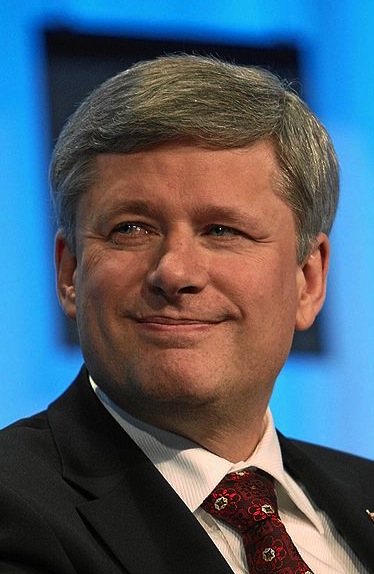Surely the wrong man has quit!
Nigel Wright, Prime Minister Stephen Harper’s chief of staff, resigned yesterday in the imbroglio that followed the revelation he gave disgraced Senator Mike Duffy $90,172 to pay back the Parliamentary expenses the supposed representative for Prince Edward Island in the Upper House had improperly claimed.
The purpose of the controversial payment, obviously, was to make the political problem created by the discovery of Senator Duffy’s unethical behavior disappear.
But the doctrine of ministerial responsibility, surely, requires that the prime minister himself must go.
Calm down, people! Your blogger recognizes this is not very likely. Harper, his cabinet, and significant portions of his Reform Party caucus, which does business under the name of the Conservative Party of Canada, hold Parliament, Parliamentary tradition, Parliamentary conventions, and Parliamentary democracy itself in contempt. This has been well understood since 2011.
Nevertheless, the doctrine of ministerial responsibility itself is quite clear.
“According to the doctrine,” says my favourite Canadian politics textbook, “the minister who heads each department must be accountable to the House of Commons for the conduct of each and every civil servant working in that department.”
“On the most basic level, this means that ministers may be asked in the House to investigate allegations of incompetence or impropriety in their departments and take appropriate measures,” explain authors Patrick Malcolmson and Richard Meyers in The Canadian Regime.
“If the incompetence or impropriety is substantial and may be attributed to poor management, however, the stakes become much higher,” they write. “Under the doctrine of ministerial responsibility the minister must take personal responsibility for major problems of mismanagement.
“In more serious cases of mismanagement, this means the minister must resign.” (In every case, the italics were added by me.)
Now, there can be no doubt that Harper is the minister responsible for the Prime Minister’s Office.
It is true that the employees of the modern institutionalized Canadian PMO are partisan political appointees outside the rules of the Public Service of Canada. Nevertheless, they are public employees paid by the taxpayers of Canada through the budget of the Privy Council Office, the prime minister’s government department. So it can be persuasively argued that under the ministerial responsibility doctrine their behaviour is the clear responsibility of the PM.
Moreover, the mismanagement in the case of Wright’s outrageous payment to Senator Duffy is of the most egregious kind, carried out by the prime minister’s closest aide.
So the prime minister’s alleged lack of knowledge, much emphasized by Conservative Party spokespeople and the media, is no excuse.
As the Wikipedia’s excellent and accurate entry on ministerial responsibility explains, “the minister is responsible even if the minister had no knowledge of the actions.”
In other words, it changes nothing if we take Prime Minister Harper at his word that he knew nothing of the actions planned and perpetrated by his closest advisor.
Wright may “accept sole responsibility” if he wishes, but under the doctrines of our Parliamentary democracy and the practicalities of real political life, the responsibility is not his alone, whether or not he or his erstwhile boss like it.
Nor is the prime minister’s statement that “I accept that Nigel believed he was acting in the public interest, but I understand the decision he has taken to resign” good enough, notwithstanding his fatuous addition of the standard Conservative Party talking points that “securing jobs and economic growth for Canada … is the focus of all our efforts and attention.”
Well, obviously not! Unless, of course, we are talking about jobs and economic growth for Tory insiders.
“A minister is ultimately responsible for all actions by a ministry because, even without knowledge of an infraction by subordinates, the minister approved the hiring and continued employment of those civil servants,” states the Wikipedia’s entry. Well, this is most certainly true in the case of Harper, who personally chose and hired Wright as his chief of staff.
Even if we accept the view that the most senior civil servants may be called before Parliament, bypassing their minister, Wright is simply too high in the food chain for such treatment.
Yet so far, unsurprisingly, not only has Harper refused to take personal responsibility in this case, he appears to be denying that he has any responsibility at all.
Nevertheless, his public acceptance of Wright’s resignation, ipso facto, acknowledges the responsibility is his.
Ergo, it is the prime minister that should resign.
Don’t hold your breath.
This post also appears on David Climenhaga’s blog, Alberta Diary.




